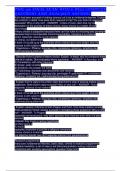PHIL 230 FINAL EXAM WITH 6 WELL COMPOSED
QUESTIONS AND ANALYSED ANSWERS.
Kuhn has been accused of making science out to be an irrational enterprise. Explain
this criticism in detail. How does Kuhn respond to this? Do you think his response
succeeds? Why or why not? - ANSWER -Critics of Kuhn claim that, by his
description of the process of theory choice, theory choice is a matter of mob
psychology
-theory choice is subjective because there can't be rules for choosing best paradigm
because they're incomparable (incommensurability), therefore it is irrational
-Kuhn responds: science is not irrational
-5 criteria, not determinate
-I think: if it is still up to the scientists which criteria have more weight, then the
process is still subjective
- Copernicus v. Ptolemy: accuracy (tie), consistency (ptolemy), simplicity (tie,
mathmatically/qualitatively)
Describe Kuhn's criteria of theory choice. Explain, in detail, why he compares these
criteria to values. Give examples where applicable. - ANSWER 1) Accuracy: is it?
2) Consistency: with other theories?
3) Scope: wider is better
4) Simplicity: the simpler the better
5) Fruitfulness: discloses new discoveries and research
- Copernicus v. Ptolemy: accuracy (tie, pre-kepler P, post-kepler C), consistency
(ptolemy), simplicity (tie, mathmatically(tie)/qualitatively(C))
Explain Kuhn's reply to his critics' claim that Kuhn's view of science makes science
subjective. Does Kuhn's reply succeed? Why or why not? - ANSWER -Kuhn
responds: science is not irrational
-5 criteria
-I think: if it is still up to the scientists which criteria have more weight, then the
process is still subjective
- Copernicus v. Ptolemy: accuracy (tie), consistency (ptolemy), simplicity (tie,
mathmatically/qualitatively)
Explain Lakatos' criticisms of both Popper and Kuhn. How does Lakatos remedy
these problems? Does Lakatos succeed in remedying these problems? Why or why
not? - ANSWER To Popper:
-scientists are tenacoious- they don't abandon their theories even when it's been
falsified.
-instead, they invent a rescue hypothesis
-or they ignore it
To Kuhn:
-scientific revolution is just like a religious conversion
-theory choice is irrational
-no objective stands (we can't separate science from psuedoscience
Research programmes:
-hard core: fundamental theories, basic ideas, central to research programmes
-positive hewistics: a set of rules to aid discovery/problem solving machinery
-protective belt: auxiliary assumptions (question these first!)
, PHIL 230 FINAL EXAM WITH 6 WELL COMPOSED
QUESTIONS AND ANALYSED ANSWERS.
Progressive: prediction of novel facts, fruitful, expands application to more cases
(science)
Degenerating: making ad hoc chances to the protective belt to cover existing
problems (as needed), don't extend the research program (psuedoscience)
Doesn't remedy Kuhn's problem because theory choice is still a choice
Explain the details of Lakatos' research programme. Explain how Lakatos' research
programme is the basis for his account of the demarcation criterion - ANSWER
Research programmes:
-hard core: fundamental theories, basic ideas, central to research programmes
-positive hewistics: a set of rules to aid discovery/problem solving machinery
-protective belt: auxiliary assumptions (question these first!)
Progressive: prediction of novel facts, fruitful, expands application to more cases
(science)
Degenerating: making ad hoc chances to the protective belt to cover existing
problems (as needed), don't extend the research program (psuedoscience)
demarcation criterion: what is science and what is psuedoscience)
Explain, in detail, Feyerabend's epistemological anarchism. Explain Feyerabend's
argument that scientists are in fact epistemological anarchists. - ANSWER Science
is not superior in giving us access to knowledge.
science is not privileged.
"Anything goes."
even Lakatos could not fix the rationality in science
Galileo's tower argument. Counterinduction is supporting hypotheses that seem to
be inconstant with observations and the current world view. It challenges, rather than
follows, observations.
science cannot be the only superior path to human knowledge.
Explain, in detail, Feyerabend's argument that science is not superior to other forms
of exploring the world. - ANSWER Galileo's tower argument.
counterindcution, there came to be a "solution" to the tower problem. Galileo rejected
the impetus theory, which states that when a force stops acting on an object, the
object will stop moving. Galileo disagreed with this. He offered new mechanics that
suggested that an object will stop moving only when a force is applied to make it
stop moving. From this, Feyerbend says that the lesson to be learned is that history
should process by counterinduction.
Explain, in detail, why Feyerabend thinks that epistemological anarchism is key to
the progress of science. Include in your answer (among other things) a discussion of
Mill's influence on Feyerabend. Contrast Feyerabend's views about the progress of
science with Kuhn's view about the progress of normal science. - ANSWER Lakatos
-not fix the problem of rationality in science, science not only path to human
knowledge. should be creative. breaking rules by counter induction. There are two
guiding principlies: -tenacity - hold on to theories when faced with anamolies.
proliferation - new ideas, no matter how crazy. best will prevail.




